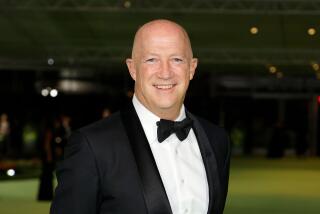‘Wacky’ Ad Team Takes On L.A.
Michael Albright has one speciality: wacky ideas.
It was Albright, after all, who three years ago had the brainstorm to feature a little-known comedian, Roseanne Barr, in off-beat TV commercials for a new grocery chain called the Giant. “It’s the opposite of what all the other supermarkets were doing,” said Albright, who spotted Barr in an HBO television special. “No one else had a fat, cynical woman as a spokesman.”
Well, the Giant didn’t make it, but after the commercials began to run, Barr quickly took off as one of the funniest women on television.
Credit Albright, as well, with creating that totally off-the-wall commercial for the TV show “Jeopardy” that featured a scientist examining two jars with what looks like human brains in them. The scientist stoically looks at the two jars and concludes that the larger brain must have belonged to someone who watched “Jeopardy.”
Last month, Albright may have hatched his wackiest idea yet--to open an advertising agency in the competitive Los Angeles market.
Albright had only recently left his high-profile job as creative director at the Los Angeles hot shop, the Shalek Agency. That’s where he created the Giant and “Jeopardy” ads. Since then, he’d mostly been working as a free-lance copywriter and had teamed up with free-lance partner Philip Labhart, who was then an executive producer at the Los Angeles office of D’Arcy, Masius, Benton & Bowles.
The idea struck Albright at 3 a.m. Late nights were the only hours that Labhart--who had a full-time job--could work. The two men, who are both 33, had just finished creating a TV ad to promote the video version of the film, “Bill & Ted’s Excellent Adventure.” They were both exhausted from another full day--and full night--of work.
“I turned to Philip and said, ‘We have no choice; we have to start an agency,’ ” recalled Albright. Labhart remembers his response. “I said, ‘My mom will make the curtains.’ ”
So, the curtains have risen for another new agency in Los Angeles. When its doors opened last week, in offices just off Melrose Avenue, Albright/Labhart joined the ranks of an estimated 250 Los Angeles agencies that continue to compete for a piece of what many executives say is a shrinking pie. And executives who know the Los Angeles advertising scene warn that the odds of the new agency surviving long term are probably not very good.
“I’d say the odds of them being around five years from now are slim,” said Greg Helm, president at the 1-year-old agency Stein Robaire Helm, which has picked up $16 million in annual billings over the past year. “But I think the chances are slim for all new agencies.”
One small but creative agency that Albright expects to compete with directly is Suissa & Associates. That firm may be best known for creating flashy billboards for Marie Callender’s and the Tropicana hotel. “The No. 1 thing is to have a reputation before you start an agency,” said David Suissa, whose agency is just 5 years old. “Creatively, they may have a reputation. But I don’t know if they have anything beyond that.”
That perception of their reputation--particularly when combined with little background in running a business--may turn out to be the new agency’s Achilles heel. “A lot of creative and talented people have failed when they tried to open their own shops,” said Nancy Shalek, who was Albright’s boss at the Shalek agency, which she opened just two years ago. “Running an advertising agency is a business. It often has little to do with good, creative talent. Keeping clients happy and keeping the money flowing is a very different thing than creating good advertising.”
Even the two partners, during the first week of operation, seemed divided over how to run the business. During an interview with a reporter, the two men briefly disagreed over whether the agency should hire a professional business manager. And after their first few days in business, they were without basic tools--like business signs and business cards. “Well,” joked Albright, “we do have some delicious muffins.”
But the two, who estimate that they have spent up to $100,000 of their combined savings to start the firm, say the many risks involved in opening a new agency in Los Angeles acted more like lures than repellents.
“It’s like falling in love,” said Albright. “You can think of millions of reasons to never ask her out, but then you go and ask her, anyway.”
Added Labhart, who was once a bit actor on TV soap operas before working his way to the top of the production ranks at DMB&B;, said: “The risk is the aphrodisiac about the whole thing.”
That philosophy seems to permeate the agency. Early on, Albright/Labhart is hardly conforming to the way most agencies operate. For example, the agency is now negotiating for the Los Angeles production rights to a play that recently closed on Broadway. “That’s the kind of thing that attracts creative people to an agency,” Albright said. “Imagine telling someone, ‘You get to do ads for a really hot play, and guess who the client is? Us.’ ”
What’s more, the agency wants to eliminate what has traditionally been one of the most powerful agency posts--the department head. Instead of department heads, creative teams will make final decisions on ads.
“The only way to be an aggressive player in Los Angeles is to do things differently,” Albright said. “Everything else has been done before.”
Certainly, the two men appear to have overcome one giant hurdle--they already have some sizable clients. In fact, they estimate that annual billings for their first year in business could exceed $7 million. Ocean Pacific Sunwear, which was formerly with the Shalek Agency, is among their clients. The firm also will be doing some projects for Epi Products, Nexxus Products Co. and Nelson Entertainment.
“Michael Albright is one of the brightest creative talents we’ve met,” said Rand Bleimeister, executive vice president at Nelson Entertainment, the Beverly Hills film production and distribution company that markets feature films for video distribution. Albright and Labhart created the TV spot for the home video of the film “When Harry Met Sally.’
The firm’s biggest client by far is Ocean Pacific, which took its estimated $4-million ad business and followed Albright away from the Shalek Agency. “Perhaps this move was less risky for us than for other major companies,” said Jerry Crosby, executive vice president of Ocean Pacific. “We’re used to dealing with small boutiques like this.”
Not that Ocean Pacific has put all its eggs in Albright’s basket. Far from it. Although the new agency will create the ads for Ocean Pacific, the Tustin-based maker of swim and ski wear will continue to use other sources to plan and buy time and space for its ads. And that’s at least $3 million worth of business.
“We didn’t want to overload them,” Crosby said. “When you’re starting something new, like these guys are, you have enough trouble just allowing people to do what they do best.”
At the same time, Albright/Labhart is taking a big risk in relying so heavily on Ocean Pacific. After all, Ocean Pacific is for sale. And after a company is purchased, one of the first things the new owner often does is change agencies.
“That risk is always there,” Labhart said. “But if you look at it that way, why even bother to get out of bed in the morning?”
Bugle Boy Bidding Old Agency Adieu
Bugle Boy wants someone else to blow its horn.
The Simi Valley maker of casual clothing said it has parted with its agency and placed its estimated $10-million to $12-million account in review. The Los Angeles agency Rubin Postaer and Associates, which also creates ads for American Honda Motor Co., handled the account for several years.
Perhaps the best-known Bugle Boy TV commercial features a woman driving a Ferrari on an isolated road in the desert. She stops near a lone man and asks, “Excuse me, are those Bugle Boy jeans you’re wearing?” When the man responds affirmatively, she says, “Thank you,” then drives off, leaving him alone.
Bugle Boy executives said the effectiveness of the ads wasn’t the problem. “We felt we were lost in the shuffle with Honda,” said Genevieve Squires, director of advertising at Bugle Boy. “They were almost much more concerned about building their reputation than serving the client.”
Agency executives deny those claims. “I can assure you, none of our other clients feel that way,” said Larry Postaer, executive vice president. “Our spots more than doubled their business. The record speaks for itself.”
More to Read
The complete guide to home viewing
Get Screen Gab for everything about the TV shows and streaming movies everyone’s talking about.
You may occasionally receive promotional content from the Los Angeles Times.






